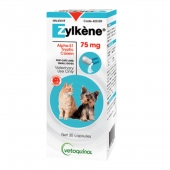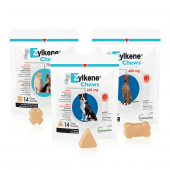1 - Act normal.
Your dog can pick up on your mood. If you’re tense during a nasty storm, they’ll likely sense something is wrong. And while you may be inclined to coddle and reassure your pet, doing so may be perceived as a reward and end up reinforcing their fearful behaviour. Instead, act normally. Calmly do whatever you’d otherwise be doing and give your four-legged friend the usual amount of attention. This can help maintain a comforting routine despite the unfamiliar experience.
2 - Provide your dog with a dark and quiet space.
It’s a good idea to keep a permanent safe space where your dog can retreat away from loud noises, whether a thunderstorm, construction work outside your home or a large family gathering. Consider leaving their carrier, with the door open, in the basement or a quiet room, and make sure they have access to food, water and their favourite toys. A treat-dispensing toy can help your dog focus on something else.
During a severe thunderstorm, closing all doors and windows, as well as adding heavy blankets on top of your dog’s carrier, can muffle the sound and tremors. Finally, close all the blinds and curtains and keep the lights on to make lightning flashes less obvious.
3 - Provide background noise.
Loud, unpredictable thunderclaps stand out against the steady drum of rain and can put your dog on edge. Experiment with various background noises to see which provides the best distraction for your four-legged friend. Try turning on your radio or TV or using a white noise machine. Some dogs find classical music to be soothing. VCA Canada suggests using rap or other music with a strong and constant beat to take your pet’s mind off the storm[1].
4 - Desensitize your dog to thunderstorms.
Desensitization is a process which involves exposing your dog to a recording of thunderstorm sounds at low volume and gradually increasing the volume over the course of several weeks. Start playing the recording softly while your dog is relaxed and calm, monitoring their reaction closely. Reward their good behaviour with treats and praise to reinforce a positive association. Slowly increase the volume during the following sessions and dial it back if you notice your dog tensing up. Be patient, and don’t be afraid to ask your veterinary clinic for advice on this process.
5 - Ask your veterinarian about dog anxiety medication.
If your dog remains anxious despite implementing the advice above, ask your veterinarian if natural supplements or medication could provide a short-term solution to stressful events. For example, Zylkene Chews contain an ingredient derived from milk protein which promotes and enhances relaxed behaviour in pets. Remember that such supplements must typically be administered a day or two before the event to be effective and thus require some planning.



